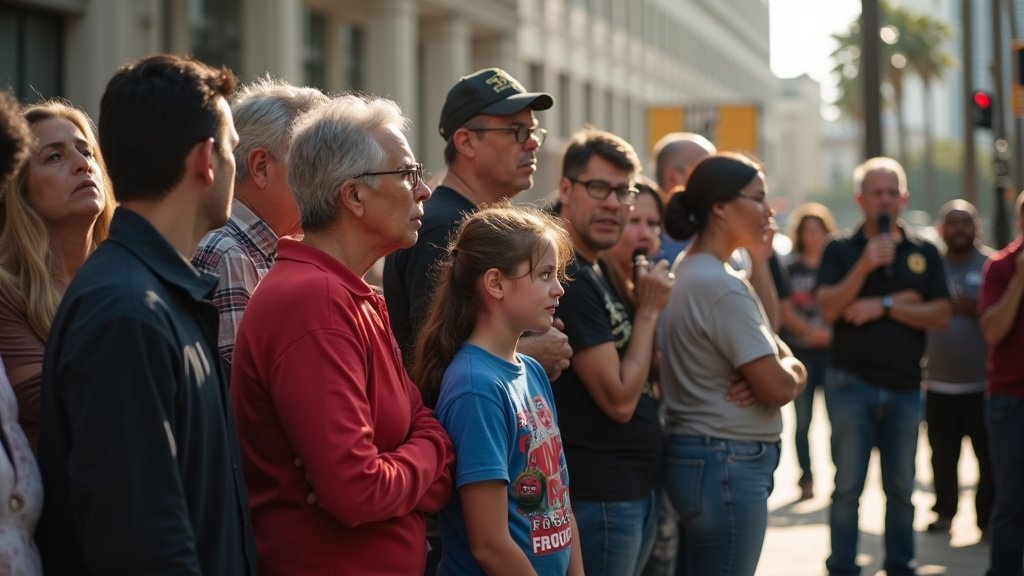LOS ANGELES – Advocates are raising alarms about the deepening **SNAP Benefits Crisis**, urging Governor Gavin Newsom to backfill critical funding for the Supplemental Nutrition Assistance Program (SNAP), known as CalFresh in California. The call to action follows the cessation of these vital benefits on November 1st, plunging nearly 5.5 million Californians into deeper food insecurity due to the current **SNAP Benefits Crisis**. This is a critical moment for the **SNAP Benefits Crisis** in California.
Advocates Address the Urgent SNAP Benefits Crisis
Standing before the downtown Los Angeles building, representatives from AHF and its housing advocacy arm, Housing Is A Human Right, voiced their deep concern over the sudden halt in SNAP benefits. Carlos Marroquin, National Director of AHF’s Food for Health program, and Susie Shannon, Policy Director for Housing Is A Human Right, highlighted the immediate hardship faced by families, seniors, veterans, and individuals with disabilities amidst this **SNAP Benefits Crisis**. As Veterans Day approached, the event underscored the precarious situation for many who have served the nation and now struggle to afford basic necessities. Following the press conference, an AHF food bank van was slated to head to the West Los Angeles Veterans’ Affairs campus to support a weekly ‘Heroes Pantry’ for veterans and service members, showcasing a community-led effort to bridge the growing gap in response to the **SNAP Benefits Crisis**.
Understanding the CalFresh Funding Halt and SNAP Benefits Crisis
The November 1st cutoff of CalFresh benefits is a direct consequence of a prolonged federal government shutdown and subsequent **federal funding disputes**. Despite court orders mandating the release of emergency funds, the situation has been marked by uncertainty, partial distributions, and ongoing legal battles between states, including California, and the federal administration. California, alongside over 20 other states, had filed lawsuits demanding the release of funds that were unlawfully withheld, contributing to the **SNAP Benefits Crisis**. This federal inaction resulted in an estimated $1.1 billion in food assistance being temporarily cut off for 5.5 million Californians in November alone, exacerbating the **SNAP Benefits Crisis**. While federal judges have compelled the administration to use contingency funds, the unpredictability of payments and the potential for further cuts loom large in this ongoing **SNAP Benefits Crisis**.
The Far-Reaching Impact of the SNAP Benefits Crisis on Californians
CalFresh serves as an essential hunger safety net for a diverse population across the state. The program provides crucial support for families, with nearly 2 million children benefiting from its assistance. For seniors, like many in San Diego County who rely on an average of $188 monthly to supplement their income, the loss of these benefits can mean choosing between food and other essential expenses such as rent and medication, a direct consequence of the **SNAP Benefits Crisis**. The **CalFresh funding halt** has had devastating effects.
Veterans are particularly impacted by the **SNAP Benefits Crisis**, with an estimated 115,000 California veterans receiving SNAP benefits. Nationally, approximately 26% of active-duty service members face food insecurity, highlighting the critical role of programs like CalFresh in supporting those who have served. **Food insecurity California** rates are substantial, with studies indicating that 1 in 5 residents, or about 8.8 million people, struggle to access adequate food. Low-income adults are even more affected, with nearly half reporting an inability to afford enough food in 2024. The crisis disproportionately affects Black, Latino, and other households of color, intensifying the **SNAP Benefits Crisis**.
State and Federal Responses Amidst Uncertainty in the SNAP Benefits Crisis
**Governor Newsom SNAP** administration has been actively engaged in legal challenges against the federal government to restore SNAP funding. California has also stepped in with state funds, fast-tracking $80 million to support food banks and community organizations struggling to meet the surging demand exacerbated by the **SNAP Benefits Crisis**. Local leaders in Los Angeles have also taken initiative, with partnerships like the YMCA’s FeedLA program distributing millions in food aid to ensure no child or family goes hungry. Despite these efforts, the reliance on federal funding means that state and local actions can only offer temporary relief from the **SNAP Benefits Crisis**.
Broader Context and Future Outlook of the SNAP Benefits Crisis
Beyond the immediate crisis, advocates are concerned about looming federal legislative changes that could further destabilize food assistance, intensifying the **SNAP Benefits Crisis**. Proposed federal legislation, such as House Resolution 1, includes significant cuts to SNAP and shifts billions in costs to states, potentially impacting millions of Californians through new eligibility restrictions and reduced benefit levels. These changes threaten to undo years of progress in combating hunger and could disproportionately harm vulnerable populations, further complicating the **SNAP Benefits Crisis**.
The efforts by AHF and Housing Is A Human Right extend beyond this immediate SNAP crisis; both organizations are deeply involved in advocating for affordable housing and health equity in Los Angeles and across the state. Their stance on food security is part of a broader commitment to human dignity and basic needs in the face of the **SNAP Benefits Crisis**.
As the federal funding situation remains in flux, the call from advocates in Los Angeles echoes a statewide demand: the restoration and protection of CalFresh benefits to ensure that millions of Californians, including seniors, veterans, and families, do not go hungry amidst this severe **SNAP Benefits Crisis**.





